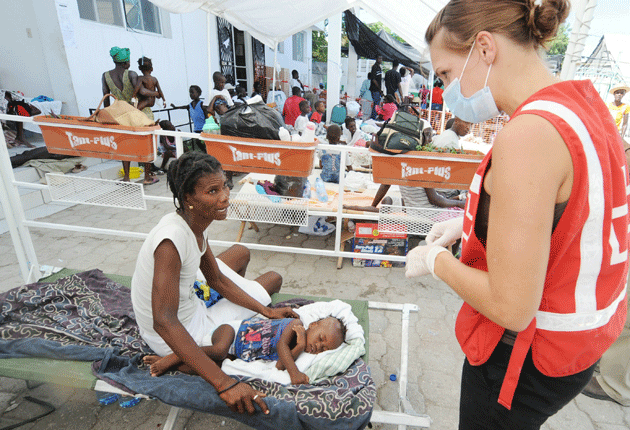Your support helps us to tell the story
From reproductive rights to climate change to Big Tech, The Independent is on the ground when the story is developing. Whether it's investigating the financials of Elon Musk's pro-Trump PAC or producing our latest documentary, 'The A Word', which shines a light on the American women fighting for reproductive rights, we know how important it is to parse out the facts from the messaging.
At such a critical moment in US history, we need reporters on the ground. Your donation allows us to keep sending journalists to speak to both sides of the story.
The Independent is trusted by Americans across the entire political spectrum. And unlike many other quality news outlets, we choose not to lock Americans out of our reporting and analysis with paywalls. We believe quality journalism should be available to everyone, paid for by those who can afford it.
Your support makes all the difference.The death rate appeared to be slowing, but fears of a cholera epidemic still gripped Haiti yesterday as health officials stressed that it was far too early to establish whether the recent outbreak of the disease had been properly contained.
Only a handful of new cases were reported as a massive aid effort swung into action to provide extra supplies of clean water to the refugee camps where roughly 1.5 million people are still living after being left homeless by January's earthquake.
In Port-au-Prince, hospitals stayed open round the clock to new patients suspected of having contracted the disease, which causes severe diarrhoea and rapid dehydration, and if undiagnosed can kill victims within hours.
A public information campaign, warning people to wash their hands and only drink purified water, seemed to have helped stem the spread of the outbreak, which has killed more than 250 and infected around 3,000 Haitians in just over a week.
"Everyone is aware of what to look for now, and what's been going on, so people are being very careful not to put themselves at risk," said David Darg, an aid worker with the organisation Operation Blessing, who was in the capital city yesterday. Understandably, there's been a slight sense of hysteria. A lot of rumours circulate and nerves are already frayed, so people here tend to react nervously to news. A lot of mums are rushing children to hospital when they actually have a simple case of mild diarrhoea. But that's probably a good thing.
"I'm also seeing a lot of people walking around with cotton wool in their nostrils. That, of course, does nothing to prevent cholera spreading, since it's carried by water, but it does show the lengths the general public is taking to protect itself."
At the weekend, officials had feared that the disease would spread rapidly through Port-au-Prince, a hugely overcrowded city that was largely reduced to rubble by the earthquake which killed an estimated 300,000 people.
Concerns grew after news that five people who arrived in the capital from the countryside had been diagnosed with 01 cholera – the most deadly strain. The disease had previously been largely eliminated from Haiti, and no cases had been reported there since the 1960s.
An outbreak centred around the Artibonite river, in the central region of Haiti 50 miles north of Port-au-Prince, had been first identified on Thursday, and chaotic scenes were reported at the biggest hospital in the region, St Nicholas, in the town of St Marc.
Scores of patients were being treated in corridors, or on makeshift beds in the hospital's garden. With huge crowds of relatives at the gates, many other victims were unable to reach a doctor. Several deaths were reported outside its gates.
Adding to the sense of growing chaos was news of new cases popping up in towns around the country. Fifty cases were reported at a prison in Mirebalais, north of the capital, and 10 more had emerged in the northern city of Gonaïves.
However, aid organisations swiftly began isolating victims, and a network of field hospitals was set up around the country. By last night, 12 cholera treatment centres were active, and the worst affected areas were being supplied with heavily chlorinated water.
For now, the efforts appear to be paying off. Just six new deaths were confirmed yesterday, bringing the total to 259. Officials are reluctant to declare the emergency over, but seem confident enough to tell reporters that it is starting to be brought under control.
"The number of deaths registered has significantly diminished, the number of people being hospitalised has also diminished," Gabriel Thimote, director general of Haiti's Health Department said. "We think the situation is stabilising, although that doesn't necessarily mean we have reached a peak."
CHOLERA
What is it?
Cholera is an acute diarrhoeal disease caused by infection of the intestine. It is extremely virulent and is contracted by eating contaminated food or drink.
Where is it found?
It affects countries with sanitation, water supply and food safety problems. The greatest risk is in developing countries and after natural disasters.
What are the symptoms?
In most cases, none except mild diarrhoea. In up to one tenth of cases it causes severe diarrhoea, dehydration and vomiting.
What are the dangers?
If untreated, cholera can kill within hours.
How is it treated?
Easily through oral rehydration salts. Severe sufferers require intravenous fluids and antibiotics.
John Elmes

Join our commenting forum
Join thought-provoking conversations, follow other Independent readers and see their replies
Comments